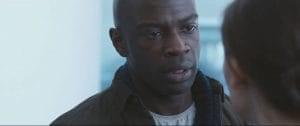
Panic takes place in London, but it’s not the London of Big Ben and Trafalgar Square. It’s the parts of town familiar to most residents but fewer tourists. High rise apartments stare out into a city landscape that is both modern and bleak. In fact, it looks like the bulk of most any city in the developed world.
From the start, the film wants us to see the alienating impact the environment has on some residents of these mausoleum-like structures designed for middle-class comfort. At first, we’re on the outside looking in, overhearing phone conversations, seeing people in the midst of their mundane lives, as if we’re spectators in an oversized urban petting zoo. Soon, we’re inside the high-rise apartment of a young music journalist, Andrew, who interviews performers over the phone when he’s not gaping with binoculars at the woman in the apartment across the way. We’re voyeurs observing a voyeur, if you will.

“Music journalist Andrew interviews performers over the phone when he’s not gaping with binoculars at the woman in the apartment across the way.”
You may already be thinking that Panic is going to revisit Rear Window, the original peeping tom crime thriller by Alfred Hitchcock, and if so, you’re pretty much on target. Panic wants to walk in Rear Window’s footsteps. But unlike Hitchcock’s classic, which takes place in essentially one setting, the action in Panic moves from Andrew’s apartment and into the outside world as the story progresses. What further separates this from the 1954 thriller is Panic’s predictable plotline, and it’s not just because the story has been done before. There’s a general lack of suspense that dampens any dramatic qualities Panic may have to offer.
As Andrew obsessively investigates possible malfeasance that may have taken place in the apartment of the woman he’s been ogling from afar, the plot moves forward with some all-too convenient coincidences. That’s not uncommon in crime films, but here they’re too numerous and clunky to be believable. In his pursuit of some unidentified villains, he happens to snatch an ordinary Chinese menu from a bad guy’s car, and, voila, it turns out to be a crucial clue that puts him hot on the trail of his quarry.

“We’re on the outside looking in, overhearing phone conversations, seeing people in the midst of their mundane lives…”
There are side plots, such as the story behind his acquired case of agoraphobia that makes him deathly afraid of leaving the shelter of his apartment, and his naughty online hookup with an adventurous gal. While in his apartment, his female friend witnesses a possible crime that took place in his neighbor’s apartment, but she won’t go to the police for fear that her escapades will become public fodder. Both subplots add drama to the story, but feel a bit contrived.
Panic is a good looking film, appropriately gritty and generally well acted. David Gyasi, as Andrew, is believably earnest as he relentlessly investigates a mystery that probably could have been handled with a simple phone call to the police, which, for unknown reasons, he can’t quite bring himself to make. But if onscreen characters did only what seems logical in the light of day, we would have few films like Panic to watch and ponder.
Panic (2104) Directed by Sean Spencer, written by Sean Spencer, starring David Gyasi, Andrew Deeley, Pippa Nixon, Jason Wong, Yennis Cheung.
6.5 out of 10
